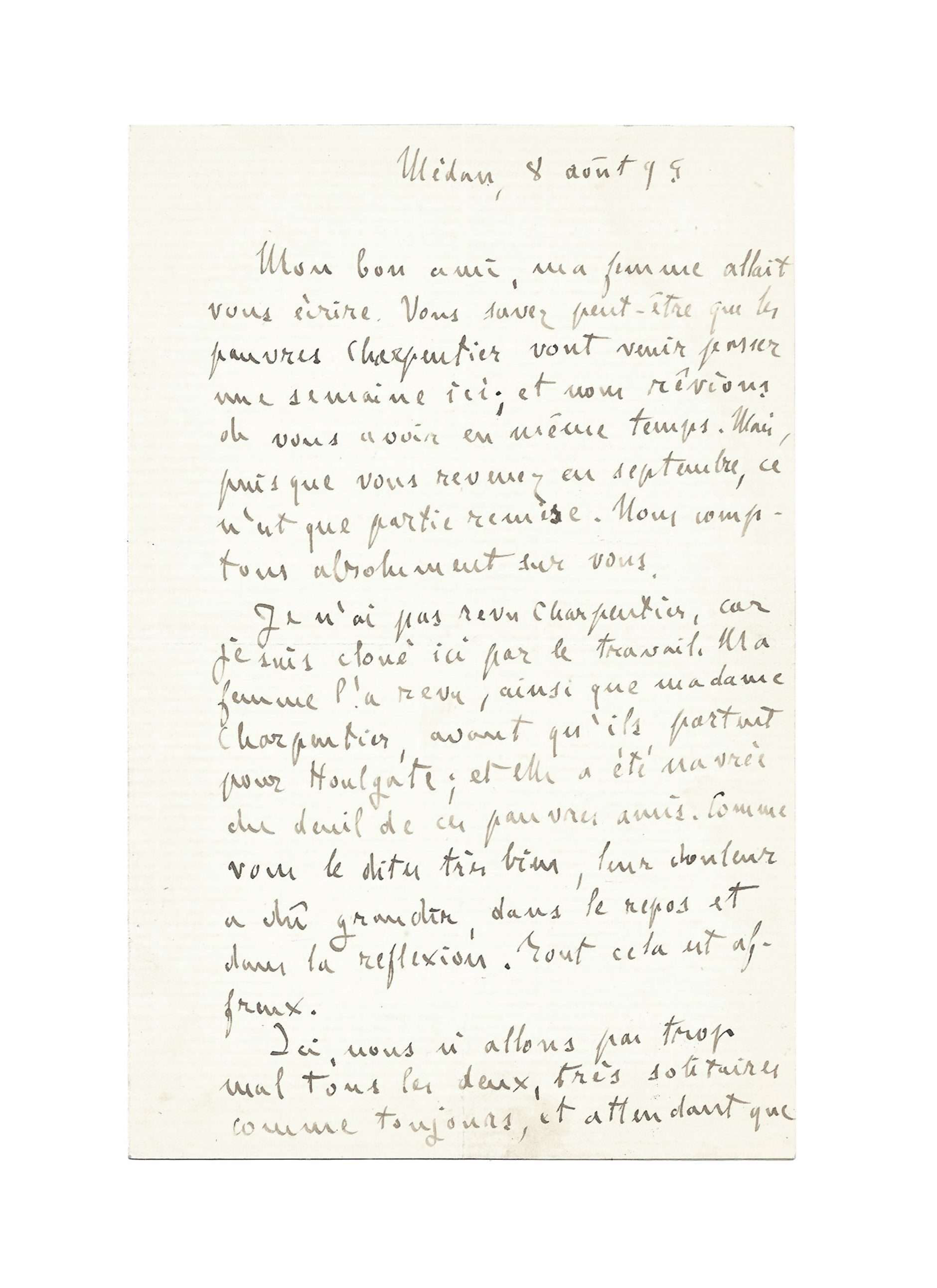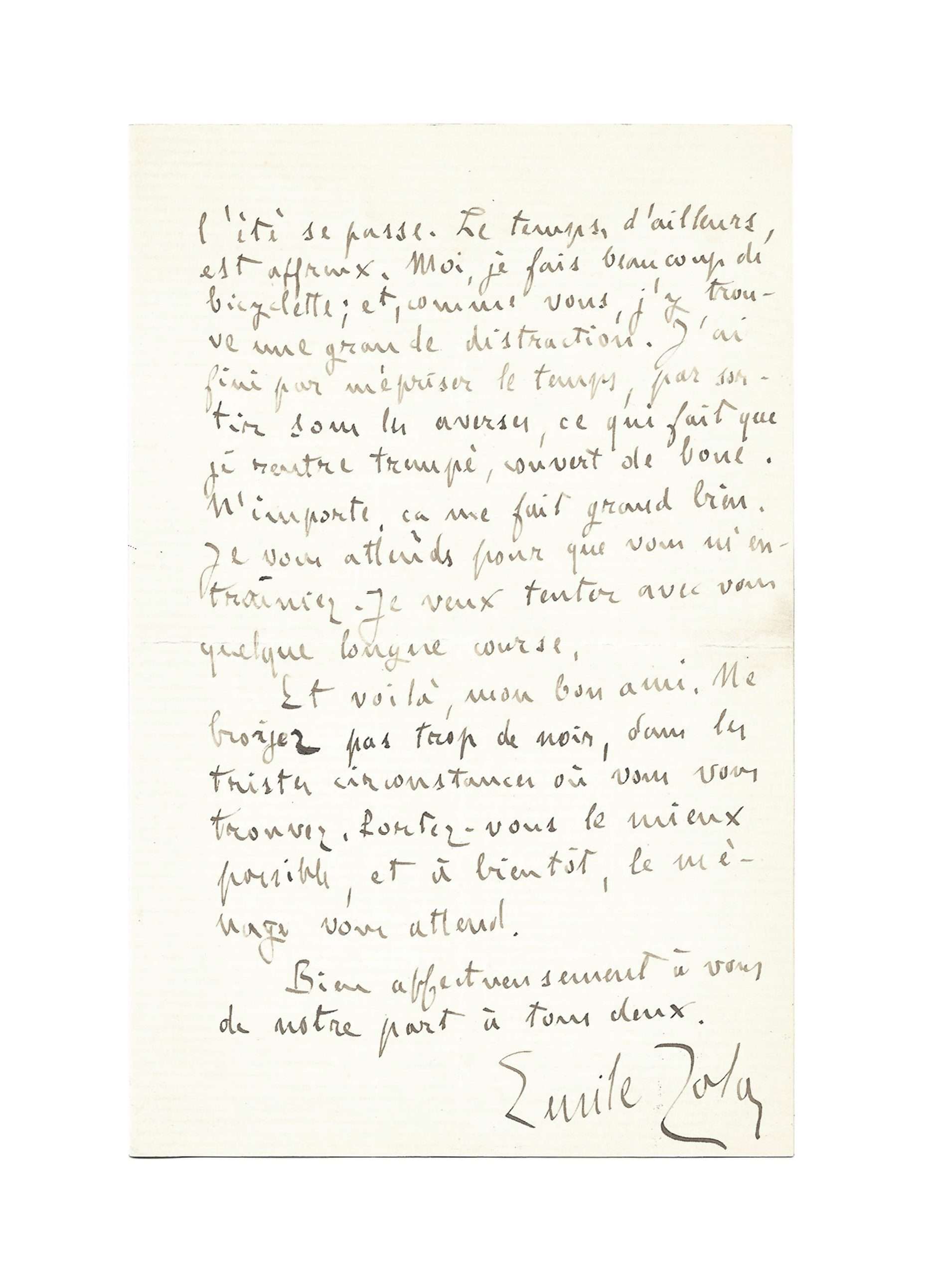ZOLA, Émile (1840-1902)
Autograph letter signed « Emile Zola » to Fernand Desmoulin
Médan, 8th August 1895, 2 pp. in-8°
« I ended up despising the weather, going out in the downpours, which means that I come back soaked, covered in mud »
Fact sheet
ZOLA, Émile (1840-1902)
Autograph letter signed « Emile Zola » to Fernand Desmoulin
Médan, 8th August 1895, 2 pp. in-8°
An affectionate letter from a solitary Zola and, as always, immersed in the writing of his novels – the writer gives us a glimpse of his lonely life and his passion for cycling
« Mon bon ami, ma femme [Alexandrine] allait vous écrire. Vous savez peut-être que les pauvres Charpentier(1) vont venir passer une semaine ici ; et nous rêvions de vous avoir en même temps. Mais, puisque vous nous revenez en septembre, ce n’est que partie remise(2). Nous comptons absolument sur vous.
Je n’ai pas revu Charpentier, car je suis cloué ici par le travail [Zola était alors en pleine rédaction de Rome, deuxième volume de son cycle romanesque Les Trois Villes]. Ma femme l’a revu, ainsi que madame Charpentier, avant qu’il partent pour Houlgate(3) ; et elle a été navrée du deuil de ces pauvres amis. Comme vous le dites très bien, leur douleur a dû grandir, dans le repos et dans la réflexion(4). Tout cela est affreux.
Ici, nous n’allons pas trop mal tous les deux, très solitaires comme toujours, et en attendant que l’été se passe. Le temps, d’ailleurs, est affreux. Moi, je fais beaucoup de bicyclette ; et, comme vous, j’y trouve une grande distraction(5). J’ai fini par mépriser le temps, par sortir sous les averses, ce qui fait que je rentre trempé, couvert de boue. N’importe, ça me fait grand bien. Je vous attends pour que vous m’entraîniez. Je veux tenter avec vous quelques longues course(6).
Et voilà, mon bon ami. Ne broyez pas trop de noir dans les tristes circonstances où vous vous trouvez. Portez-vous le mieux possible, et à bientôt, le ménage vous attend.
Bien affectueusement à vous de notre part à tous les deux.
Émile Zola »
1- The Charpentier couple had just lost Paul, their third child, who died suddenly at the age of 20.
2- Desmoulin, who had been a widower since 5 June 1894, was on holiday at Châtillon-en-Bazois (Nièvre); he had come to Paris for the funeral of Paul Charpentier. On 3 August he had written to Zola: “The other day, in the cemetery, I looked for you in vain, […] I have not been able to say good-bye to you, for I was leaving the next day for Châtillon, where I am still, all alone, and not cheerful, I assure you. I’ll be back in September, what about you? In fact, Zola met him in Paris on August 28.
3- The Fasquelle family spent the month of August in Houlgate.
4- “I have received several news from the Charpentier,” Desmoulin continued in the above-mentioned letter. “I believe that the present moment is even more cruel to them than the hours of struggle, during which a glimmer of light, very faint, but at last a glimmer of hope still remained. It’s a succession of sadnesses that makes me spend a strange holiday.”
5- Her bicycle, Desmoulin wrote, was her “dear comforter”
6- Zola was already taking long walks. On 31 August, his wife wrote to Élina Laborde: “He gave himself a velodrometer, and he was able to see that from the house on rue de Bruxelles, to here, at home, passing through Saint-Germain, it is 34 kilometres.” Passionate about photography, Zola often staged himself with his bicycle in the last years of his life.
Georges Charpentier (1846-1905) was a close friend of Flaubert, Maupassant and Zola. He promoted Impressionist painters and built up an important art collection with his wife, Marguerite.
French painter and engraver Fernand Desmoulin (1853-1914) was a contributor to La Vie moderne. There he met Georges Charpentier, with whom he became friends, and then, from 1887, Émile Zola.
Bibliography:
Œuvres complètes, t. XIV, éd. Henri Mitterrand, Nouveau Monde, p. 1489 – 1490
Correspondance, t. VIII, éd. du CNRS, Les Presses de l’université de Montréal, p. 245, n°232
Provenance:
Docteur François-Jacques Émile Zola’s collection



